Archives of Pulmonology and Respiratory Care
Heart failure and chronic obstructive airway disease as combined comorbidities. Meta-analysis and Review
Hadi AR Hadi Khafaji* and Asim Cheema
Cite this as
Hadi Khafaji HA, Cheema A (2019) Heart failure and chronic obstructive airway disease as combined comorbidities. Meta-analysis and Review. Arch Pulmonol Respir Care 5(1): 015-022. DOI: 10.17352/aprc.000037Background: The existence of COPD and heart failure in elderly population adds additional morbidity and mortality risk than if those with only one of the two comorbidities. The aim of the current meta-analysis was to explore the effect of COPD on heart failure patient in terms of all-cause mortality, cardiac mortality and recurrent heart failure hospitalization.
Methods and results: A comprehensive search of PubMed, MEDLINE, Embase and Cochrane was conducted until August 2017. The total standardized mean difference, with 95% (CI), was estimated for fixed and random effects models to present “pooled effect” for continuous outcomes (mean ± standard deviation or median ± interquartile range) & categorical outcomes (Odds risk OR). Statistical heterogeneity among studies was assessed with Cochran’s Q test and the I2 statistic. A total of 15 observational studies were analyzed. COPD and heart failure patients have higher: short term (in hospital, 1-3 months) (P=0.009, 0.0006 respectively), long term all-cause mortality (1& 2-5 years) (P=0.00001, 0.04 respectively), long term cardiac mortality (P=0.02) and more frequent hospitalization for heart failure (P=0.002). GOLD stage II-IV COPD had higher long-term all-cause mortality (P<0.0001) but not long-term cardiac mortality (P=NS). Beta blockers treatments appear to decrease all-cause mortality in COPD with heart failure (P <0.0001).
Conclusion: Heart failure patients with COPD have frequent heart failure hospitalization, higher long-term cardiac mortality, short- and long-term all-cause mortality that is more evident in advanced stage of COPD. Beta blockers use appear to be safe and decrease mortality in these patients.
Introduction
The co-occurrence of heart failure (HF) and chronic obstructive pulmonary disease (COPD) that share common clinical presentation and risk factors is common in the elderly population, such overlap makes the diagnosis of COPD in HF and vice versa challenging [1,2].
The existence of these clinical syndromes in elderly population adds additional morbidity and mortality risk than if those with only one of these diseases [3]. Furthermore, it will add dilemma to recognition of each when these disorders exist and leads to over diagnosis of heart failure in COPD patient or under diagnosis of COPD in heart failure patients [4]. Treatment interaction, the more complex issue is that the treatment of one may adversely affect the other [5], as bronchodilator may cause tachycardia and may precipitate heart failure furthermore beta blockers and diuretics may adversely affect COPD.
The above 2 clinical presentation has not analyzed systematically, with the presence of only observational studies that supply both cardiologist and internist with inconsistent information. We choose to systematically analyze the available research article, so we can reach final conclusion about the morbidity and mortality interaction between these conditions when heart failure patient with COPD presented with acute exacerbation.
The aim of the current meta-analysis was to explore the effect of COPD on heart failure patient in term of short- and long-term all-cause mortality and cardiac mortality and the effect of COPD on recurrent heart failure hospitalization.
Methods
Search strategy & data collection
A comprehensive search of PubMed, MEDLINE, Embase and Cochrane was conducted until August 2017, using combination of keywords; heart failure, COPD, all-cause mortality, cardiac mortality recurrent heart failure hospitalization. Along with available studies electronic search was done for abstracts, conference proceedings, unpublished and observational studies. References cited in the studies were reviewed for additional information. The flow diagram shown in Figure 1, the search strategy yields 15 observational studies that met the study criteria.
Criteria for study selection and qualitative assessment
The inclusion and exclusion criteria for the studies in the current meta-analysis are shown in Figure 2. Data regarding publication status, study design, patient-related characteristics, treatment regimens, outcome methods and results was extracted according to the standard protocol independently by 2 individual researchers. Any conflicts or incongruities were resolved by mutual agreement.
Clinical end points studied
The clinical endpoints that were analyzed in this meta-analysis are short- and long-term all-cause mortality, early and late cardiac mortality in all COPD patient and in subgroups as per COPD GOLD stages, recurrent heart failure hospitalization and the effect of B blocker treatment on all-cause mortality.
Statistical analysis
Review manager 5.3 (The Nordic Cochrane Centre, The Cochran Collaboration, Copenhagen, Denmark) was used for the analysis. The total standardized mean difference (SMD), with 95% confidence interval (CI), was estimated for fixed and random effects models to present “pooled effect” for continuous outcomes (mean ± standard deviation or median ± interquartile range) & categorical outcomes (Odds risk OR). Statistical heterogeneity among studies was assessed with Cochran’s Q test and the I2 statistic. The studies were considered statistical heterogeneous if p <0.05 and I2 ≥ 50% [6,7]. A random effect model was used for analysis to determine the heterogeneity, and fixed effect model was used in case of homogeneity. Statistical significance value was set at 0.05. Processing of the data and reporting of results were performed according to accepted principles of systemic review and meta-analysis. In order to assess potential publication bias, or “small-study effect”, we used the funnel plot, which provides a good visual evaluation of sampling bias.
Results
A total of 15 observational studies [8-22], were identified, the baseline clinical characteristics of the patients included are shown in Table 2, Males were the predominant gender in these studies with the mean age shown being above 65 years of age with similar rate of CAD hypertension and dyslipidemia.
Patients with COPD and heart failure have higher short term (in-hospital, 1-3 months) (P=0.009, 0.0006 respectively, and long-term mortality (1 year, 2-5 years) (P=0.00001 for both) with moderate heterogeneity between the included studies) Figure 3.
The short-term cardiac mortality appears to be non-significantly (P=0.07) higher in COPD patients while the long-term cardiac mortality appears to be significantly higher (P=0.02) in COPD patient with heart failure with moderate heterogeneity between the included studies Figure 4.
COPD patient with heart failure have more frequent hospitalization for heart failure (P=0.002) with mild heterogeneity between the included studies Figure 5.
The heterogeneity of all the variable analyzed is shown in Funnel plots in Figure 6.
Patient with advanced stage [11,13,19], of COPD i.e. GOLD stage II-IV when compared to GOLD 0-I and non-COPD had higher long-term all-cause mortality (P<0.0001) [11,19], but not long-term cardiac mortality (P=NS). Figure 7 A,B.
Beta blockers treatments appear to decrease all-cause mortality [8,10,11], in COPD with heart failure as it does with non-COPD with heart failure (P <0.0001) Figure 7 C.
The multivariate analysis of the all-cause mortality predictors was shown in Table 1. The age, diabetes, COPD stage, low ejection fraction, and impaired renal function were the most frequent predictors in the included studies.
Discussion
Heart failure and COPD as combined comorbidities presents a great diagnostics and therapeutic challenges, because both conditions share features such as; presentation in advanced age, common symptoms of dyspnea and smoking as a risk factor, in addition to that, treatment of one condition may affects the other [1]. Unfortunately, this issue has not been studied systematically in randomized stream and even forgotten in major clinical trials. To the best of our knowledge this the first meta-analysis that explored the impact of COPD in heart failure patient. The absence of randomized trial makes the final result biased in many aspects. As we can see from the current analysis, few conclusions have been withdrawn:
First: The presence of COPD adds an increased risk of both short and long term all-cause and long-term cardiac mortality in period of the follow up of the included studies which appear to be satisfactory in most of the studies that reach up to 5 years.
Second: Heart failure exacerbation on the background of COPD may be explained by many mechanisms; the low-grade inflammation, underuse of β-blockers, and adverse CV effects of bronchodilators [14,15]. The increased hospitalization rates in patients with HF and COPD may also be related to improvement in HF prognosis with contemporary therapies i.e. increase heart failure population. Alternatively, the improved survival of patients with HF and COPD, there is a larger population at risk for hospitalization.
Third: The severity of COPD appears to be directly proportional to the heart failure all-cause mortality and cardiac mortality and it appear that heart failure patient with advanced COPD i.e. GOLD stage ≥ II die from non-cardiac causes that related to associated comorbidities like diabetes and renal failure and advanced age as shown the mortality predictors in Table 2, though the mortality predictors were assessed only in few studies.
Fourth: Treatment of HF as per heart failure guidelines, necessitate the addition of beta blockers even in COPD patients, because there is no evidence that HF should be treated differently in patients with this comorbidity. B-Blockers are strongly recommended in all patients with systolic HF, including those with coexistent COPD [23-25], with cardio-selective b-blockers as the default [26,27]. The result from the current analysis showed that treatment with B blocker had mortality benefit though this issue has been assessed in 3 studies [8,10,11], only, but still it gives the preliminary idea that beta blockers are safe in the patients subset, though we are unable to analyze the beta blocker selectivity as this issue has not been investigated in the included studies and despite concerns regarding β blockers in patients with HF with COPD, there was no evidence that β-blocker selectivity was associated with differences in outcomes for patients with HF with COPD versus those without as in OPTIMIZE-HF registry sub-analysis [28]. The available evidence suggests that COPD patients treated with cardio selective beta-blockers has no significant short-term impact on airway function or COPD exacerbations. However, the trials were small and of short duration. Given their substantiated benefit in conditions such as heart failure, coronary artery disease and hypertension, cardio selective beta-blockers should be considered for patients with COPD, but administered with careful monitoring since data concerning long term administration and their effects during exacerbations is not available on wide scale.
Fifth: The mortality predictors in this patient’s population are variable but there are common predictors as shown in Table 1, these predictors appear to be the combination of mortality risk factors of COPD and HF, such as age, diabetes, chronic kidney disease, low ejection fraction, in addition to well-known other factors like liver disease, low systolic blood pressure, lower serum sodium, lower admission weight, and depression. The use of statins and beta-blockers at discharge was associated with significantly decreased mortality as shown in retrospective analysis of OPTIMIZE-HF registry in patient without COPD [29].
Strength and limitations
The strength of this research is that it is the first meta-analysis done in this field of heart failure patients with COPD who presented acutely or chronically. The current meta-analysis result was extracted from observational studies most of which are retrospective analysis of major heart failure registries that can result in publication bias. In addition, the definition and staging of COPD was not available in many studies and that patient were considered to have COPD as per medical record and no spirometry done in these studies (only one prospective study included), the low number of patients included explore the need for large study that can achieve statistical power. The conclusion regarding B blockers in heat failure patient with COPD need to be interpreted carefully as this include relatively small number of patients from few retrospective studies though one of which was retrospective analysis of major heart failure registry, again necessitate the need for a large randomized controlled trial in this field.
Conclusion
Heart failure patient with COPD appear to have more frequent heart failure hospitalization, higher long-term cardiac mortality, short- and long-term all-cause mortality and this more apparent in advanced stages of COPD reflect the synergistic effect of both comorbidities. Beta blockers use appear to be safe as it decreases mortality in these patients.
- Rutten FH, Cramer MJ, Lammers JW, Grobbee DE, Hoes AW (2006) Heart failure and chronic obstructive pulmonary disease: An ignored combination? Eur J Heart Fail 8: 706-711. Link: http://bit.ly/2Z2LrmT
- Rutten FH, Cramer MJ, Lammers JW, Grobbee DE, Hoes AW (2006) Heart failure and chronic obstructive pulmonary disease: An ignored combination? Eur J Heart Fail 8: 706-711. Link: http://bit.ly/2Z2LrmT
- Iversen KK, Kjaergaard J, Akkan D, Kober L, Torp-Pedersen C, et al. (2010) The prognostic importance of lung function in patients admitted with heart failure. Eur J Heart Fail 2: 685-691. Link: http://bit.ly/2KTSnc4
- Brenner S, Guder G, Berliner D, Deubner N, Fröhlich K, et al. (2013) Airway obstruction in systolic heart failure–COPD or congestion? Int J Cardiol. 168: 1910-1916. Link: http://bit.ly/33KiZ7I
- Salpeter SR (2004) Cardiovascular safety of beta(2)-adrenoceptor agonist use in patients with obstructive airway disease: a systematic review. Drugs Aging 21: 405-414. Link: http://bit.ly/2P5VDX7
- Higgins JP, Thompson SG (2002) Quantifying heterogeneity in a meta-analysis. Stat Med 21: 1539-1558. Link: http://bit.ly/2TMIWPJ
- Higgins JP, Thompson SG, Deeks JJ (2003) Altman DG.Measuring inconsistency in meta-analyses. Bmj 327: 557-560. Link: http://bit.ly/2KYiZIC
- Khafaji HA, Sulaiman K, Singh R, Alhabib KF, Asaad N et al. (2015) Chronic Obstructive Airway Disease among Patients Hospitalized with Heart Failure; Clinical Characteristics, Precipitating Factors, Management and Outcome: Observational report from the Middle East. Acute cardiac care 17: 55-56. Link: http://bit.ly/2KTCimr
- Straburzyńska-Migaj E, Kałużna-Oleksy M, Maggioni AP, Grajek S, Opolski G, et al. (2015) Patients with heart failure and concomitant chronic obstructive pulmonary disease participating in the Heart Failure Pilot Survey (ESC-HF Pilot) - Polish population. Arch Med Sci 11: 743-750. Link: http://bit.ly/2ZhlATc
- Parissis JT, Andreoli C, Kadoglou N, Ikonomidis I, Farmakis D, et al. (2014) Differences in clinical characteristics, management and short-term outcome between acute heart failure patients chronic obstructive pulmonary disease and those without this co-morbidity. Clin Res Cardiol 103: 733-741. Link: http://bit.ly/2TQm41M
- Yoshihisa A, Takiguchi M, Shimizu T, Nakamura Y, Yamauchi H, et al. (2014) Cardiovascular function and prognosis of patients with heart failure coexistent with chronic obstructive pulmonary disease. J Cardiol 64: 256-264. Link: http://bit.ly/2Zk2Cvu
- Fisher KA, Stefan MS, Darling C, Lessard D, Goldberg RJ (2015) Impact of COPD on the mortality and treatment of patients hospitalized with acute decompensated heart failure: the Worcester Heart Failure Study. Chest 147: 637-645. Link: http://bit.ly/31RSR98
- Arnaudis B, Lairez O, Escamilla R, Fouilloux A, Fournier P, et al. (2012) Impact of chronic obstructive pulmonary disease severity on symptoms and prognosis in patients with systolic heart failure. Clin Res Cardiol 101: 717-726. Link: http://bit.ly/2Z4WI5O
- Mentz RJ, Schmidt PH, Kwasny MJ, Ambrosy AP, O'Connor CM, et al. (2012) The impact of chronic obstructive pulmonary disease in patients hospitalized for worsening heart failure with reduced ejection fraction: an analysis of the EVEREST Trial. J Card Fail 18: 515-523. Link: http://bit.ly/2Zcduv3
- Mentz2 RJ, Fiuzat M, Wojdyla DM, Chiswell K, Gheorghiade M, et al. (2012) Clinical characteristics and outcomes of hospitalized heart failure patients with systolic dysfunction and chronic obstructive pulmonary disease: findings from OPTIMIZE-HF. Eur J Heart Fail 14: 395-403. Link: http://bit.ly/33MYIOQ
- O'Kelly N, Robertson W, Smith J, Dexter J, Carroll-Hawkins C, et al. (2012) Short-term outcomes in heart failure patients with chronic obstructive pulmonary disease in the community. World J Cardiol 4: 66-71. Link: http://bit.ly/2Mq8rp6
- De Blois J, Simard S, Atar D, Agewall S (2010) Norwegian Heart Failure Registry. COPD predicts mortality in HF: the Norwegian Heart Failure Registry. J Card Fail16: 225-229. Link: http://bit.ly/2MsEAwk
- Lainscak M, Hodoscek LM, Düngen HD, Rauchhaus M, Doehner W, et al. (2009) The burden of chronic obstructive pulmonary disease in patients hospitalized with heart failure. Wien Klin Wochenschr 121: 309-313. Link: http://bit.ly/33GxUjz
- Mascarenhas J, Lourenço P, Lopes R, Azevedo A, Bettencourt P (2008) Chronic obstructive pulmonary disease in heart failure. Prevalence, therapeutic and prognostic implications. Am Heart J 155: 521-525. Link: http://bit.ly/2KZJOwj
- Rusinaru D, Saaidi I, Godard S, Mahjoub H, Battle C, et al. (2008) Impact of chronic obstructive pulmonary disease on long-term outcome of patients hospitalized for heart failure. Am J Cardiol 101: 353-358. Link: http://bit.ly/2P2OWF6
- Staszewsky L, Wong M, Masson S, Barlera S, Carretta E, et al. (2007) Valsartan Heart Failure Trial Investigators. Clinical, neurohormonal, and inflammatory markers and overall prognostic role of chronic obstructive pulmonary disease in patients with heart failure: data from the Val-HeFT heart failure trial. J Card Fail 13: 797-804.
- Macchia A, Monte S, Romero M, D'Ettorre A, Tognoni G (2007) The prognostic influence of chronic obstructive pulmonary disease in patients hospitalised for chronic heart failure. Eur J Heart Fail 9: 942-948. Link: http://bit.ly/2KS9lHE
- (2006) The Heart Failure Society of America. Executive summary: HFSA 2006 comprehensive heart failure practice guideline. J Card Fail 12: 10-38.
- (2013) Global Initiative for Chronic Obstructive Lung Disease. Global Strategy for Diagnosis, Management, and Prevention of COPD.
- McMurray JJ, Adamopoulos S, Anker SD, Auricchio A, Böhm M, et al. (2012) ESC guidelines for the diagnosis and treatment of acute and chronic heart failure 2012: the Task Force for the Diagnosis and Treatment of Acute and Chronic Heart Failure 2012 of the European Society of Cardiology. Developed in collaboration with the Heart Failure Association (HFA) of the ESC. Eur Heart J 33: 1787-847. Link: http://bit.ly/2ZexNrV
- Hawkins NM, Petrie MC, Macdonald MR, Jhund PS, Fabbri LM, et al. (2011) Heart failure and chronic obstructive pulmonary disease the quandary of beta-blockers and beta-agonists. J Am Coll Cardiol 57: 2127-2138. Link: http://bit.ly/2Perhlo
- Salpeter S, Ormiston T, Salpeter E (2005) Cardioselective beta-blockers for chronic obstructive pulmonary disease. Cochrane Database Syst Rev 2: CD003566. Link: http://bit.ly/2TJKh9U
- Mentz RJ, Wojdyla D, Fiuzat M, Chiswell K, Fonarow GC, et al. (2013) Association of beta-blocker use and selectivity with outcomes in patients with heart failure and chronic obstructive pulmonary disease (from OPTIMIZE-HF). Am J Cardiol 111: 582-587. Link: http://bit.ly/30jxJZl
- O'Connor CM, Abraham WT, Albert NM, Clare R, Gattis Stough W, et al. (2008) Predictors of mortality after discharge in patients hospitalized with heart failure: an analysis from the Organized Program to Initiate Lifesaving Treatment in Hospitalized Patients with Heart Failure (OPTIMIZE-HF. Am Heart J 156: 662-673. Link: http://bit.ly/2NpuiMO
Article Alerts
Subscribe to our articles alerts and stay tuned.
 This work is licensed under a Creative Commons Attribution 4.0 International License.
This work is licensed under a Creative Commons Attribution 4.0 International License.
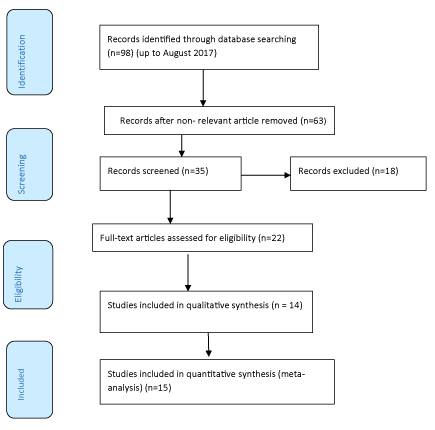

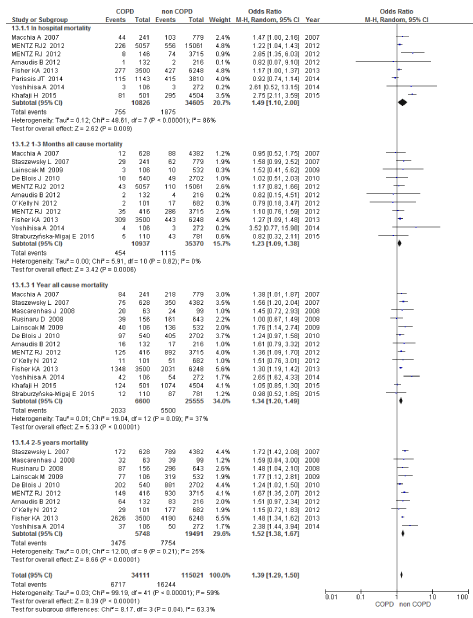
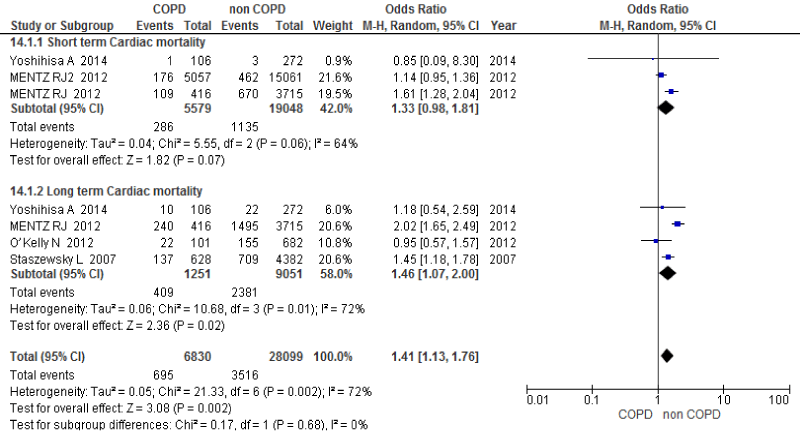

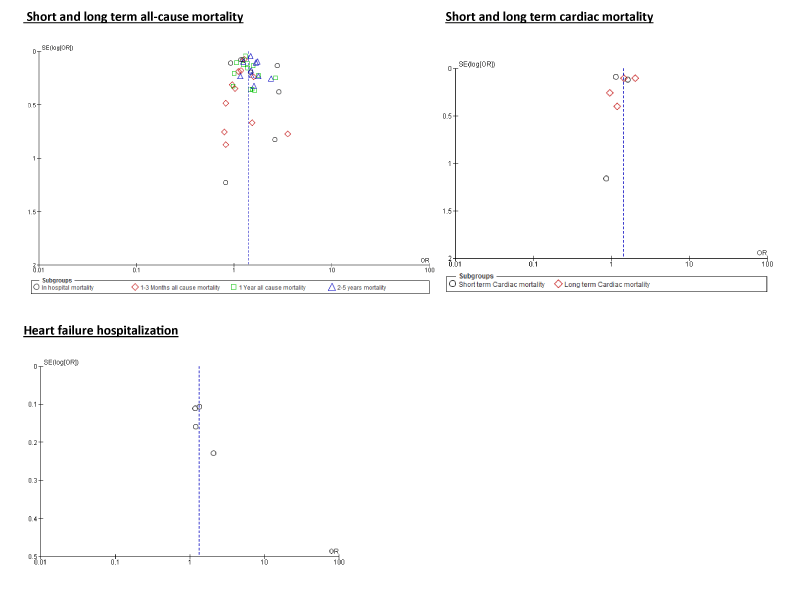
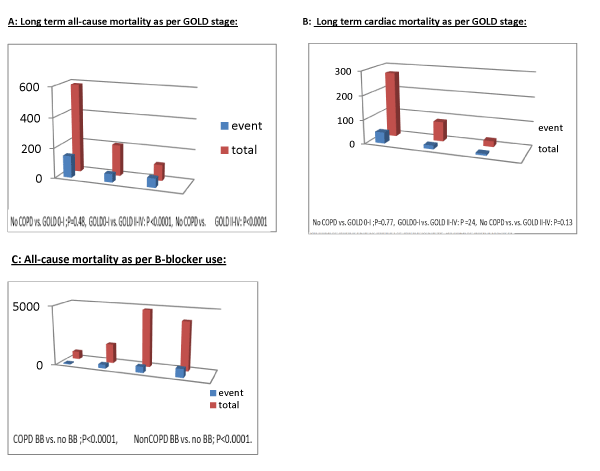
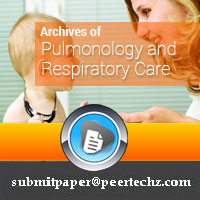
 Save to Mendeley
Save to Mendeley
